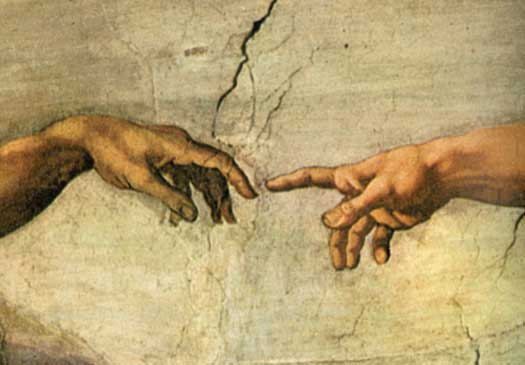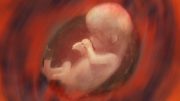Reprinted from LivingRightly.net
The prior article focused on justice. Today’s focuses on life, but not the political hype surrounding the issue. Instead it emphasizes why we have the gift of life and its implications by considering who God is and the relationship man is to have with Him, before closing with some points about how modern liberalism corrupts this view.
Who Is God?
God is the creator of everything that has ever been created. He is the source of all life. There is no other. All man’s theories are just that, and all have desperately searched for some corroborating evidence—only to find the deeper they go the more the evidence supports a Biblical world view. It actually takes a great deal of faith for man to hold onto his theories.
God’s act of creation makes Him its governor. As He has the power to create, he also has the power to change or end at any time. His act of creation is evidence not only of His authority but also His goodness, because it is surely better to be than not to be.
There are several implications from these previous statements. First, God is separate from creation. All acts of creation involve separation. Second, God is not only good, but the source of all good. Therefore, He is the source of all morality as morality is the quality of rightness or virtue—doing good.
What Is Man?
We belong to God in two ways. First, man too is a part of His creation. In this respect man has no choice in his belonging to God. However, man was given free will—that is, the freedom to make his own choices. The second way man belongs to God is voluntary on his part, that is whether we each choose to accept God’s governance.
Man was created differently from the rest of creation, as God breathed His spirit into him. All man has been created from one man—Adam. We therefore all share the same kinship and nature. This is the basis for our equality, an equality based solely on our shared nature and not outcomes. Man was made male and female in order to procreate, as man was given dominion over the rest of creation. This dominion requires exercising stewardship, a subject for a later article.
But there is a further sense of equality that needs to be mentioned before closing this section. We are not only called to accept God’s governance as individuals, but also as a single people—His people. This requires at least two things. First, acknowledging our shared nature, the equality we are all to have in terms of our rights. That was one object of the last article about justice. The second is a shared commitment to the common good. This latter point will be included in the final article. They are mentioned here because both arise from the gift of life God gave to man. This leads to the topic of grace.
Implications of Life
I love Thomas Aquinas’ explanation of grace. It is both simple and direct. It consists of three parts, which occur in the order presented. His example uses the king’s grace. First, the king loves one of his soldiers. Second, out of that love he gives the soldier a gift, one given freely (gratis) without any strings attached. Third, because of that gift the soldier responds with love for his king. It is all about love. The king is God, and the soldier man.
Life and Love
Love is experiential; it requires a relationship. We therefore have a right to that love, a negative right in that one man is not to prevent another from receiving it. But all rights come with a corresponding duty. Just as the soldier responded with love to his king, we have a duty to respond with love to God, and this love requires us having a relationship with Him—that we come to know Him. As creator God does not need us, but man needs Him.
Life is Sacred
As all life comes from God, creation’s ruler, all life belongs to Him and is therefore sacred. It is God’s first gift to us. It does not matter whether that life is inside or outside the womb, because each human being has a right to the things necessary to support life. These include not only material things such as food, water, clothing, and shelter, but intangibles such as honor, truthfulness, respect, protection, and contentment with what you have. The latter are virtues. Virtue requires becoming good, allowing ourselves to be transformed into God’s likeness as much as we are humanly able. That is man’s purpose.
The Right to Life is a Negative Right
The right to life is also a negative one. It is not unlimited. We are free to take actions up to the point where we may do harm to another. Thus the command not to kill. This gift also comes with a duty for each of us to try and fulfill our purpose as best we can. To utilize the gift of life we’ve been given.
Man and Abortion
Abortion is an example of man creating a positive right diminishing one of God’s negative rights. No different from when man created the positive right to own another human being (slavery) thereby negating another’s rights to both life and making their own decisions. Positive rights create conflict and coercion within society as noted in the previous article.
It comes down to man’s desire to create his own values, of man turning away from God and toward himself. God’s rules for man’s living with others basically comes down to honor, respect, and honesty. Honor for those in authority, including God. Respect for other’s possessions, and honesty in our relationships. All are subject to these same requirements as we all share the same nature, and this is why justice is about process and not specific ends. We are all in different places with different needs. Man cannot devise a system incorporating the hundreds of millions of daily decisions we make. Only some are arrogant enough to try by limiting our choices.
Abortion Arguments Present False Choices
The arguments advocating ending a human life through abortion come down to man’s choosing when life begins. An analogy. A seed held in your hand contains the potential for life. Placed in the soil, with the right conditions, it breaks its covering and sends forth both roots and a shoot. Life begins when the seed starts the process to break through its covering. Cells begin to divide and grow. If that did not happen, then there would be no life.
It is little different for a human being. The sperm and egg represent the potential for life. Once they join, a miracle occurs and cells begin to divide and grow. There is life. Arguing how many weeks until it is actually a life is analogous to arguing that a plant must be within such and such a distance from the surface before it is deemed to live. It is a foolish argument unworthy of serious consideration. However, those arguments are little different from the ones used to support slavery. Both are morally wrong.
When Man Creates His Own Values
There are several implications for society when man creates his own values. We mention two here. Others will be presented in due course. First, man is not entirely rejecting God’s values. Instead, he is picking and choosing which values to keep and which to reject. He keeps equality, but one based upon outcomes (the material) instead of our nature (the eternal). He keeps charity, but one based upon government assistance (dependence) instead of individual self-sacrifice in assisting others (independence). Done away with are values such as the sanctity of life (abortion and euthanasia), marriage (same sex marriage) and gender based on emotion instead of biology.
Second, is man capable of picking and choosing which of God’s values and morality to keep? No. Man is insufficient as a starting point for such a task as he is both finite and not inherently good. Only God is infinite and inherently good. Additionally, not all human beings like the same thing, to the same degree, in the same proportion or manner. These make it impossible for man to create meaningful values on his own. But there is yet another reason. For man to be independent of God’s morality, he must reject all of it. If man accepts any part, no matter how small, then he is still subject to God’s morality, a morality based upon God’s nature and authority alone.
Conclusion
These notions found expression in the recent Kavanaugh hearings. Both Judge Kavanaugh’s and Professor Ford’s lives were destroyed. Their rights to life’s intangible things mentioned earlier; honor, respect, truthfulness, and protection were taken from them by the very people who swore oaths to serve them. One because his destruction was the specific end, and the second because she was the means to that end—she was collateral damage, sacrificed for a ‘greater good.’ A false choice. From liberalism’s perspective, the ends are all that matter, the means of achieving them do not. Ends based justice is unjust, as these hearings demonstrated all too well. My heart and prayers go out to them both.
It was a matter of some individuals choosing to do evil by denying the right to life to two people who both deserved better. Ideas have consequences. They shape our actions, and those actions shape our character. They determine who we each become. There are only two choices, good or evil. Which principles will we support through our vote? That choice is always ours to make, and it is never too late to change.
More on this topic can be found in my new book A Handbook of Natural Rights.





